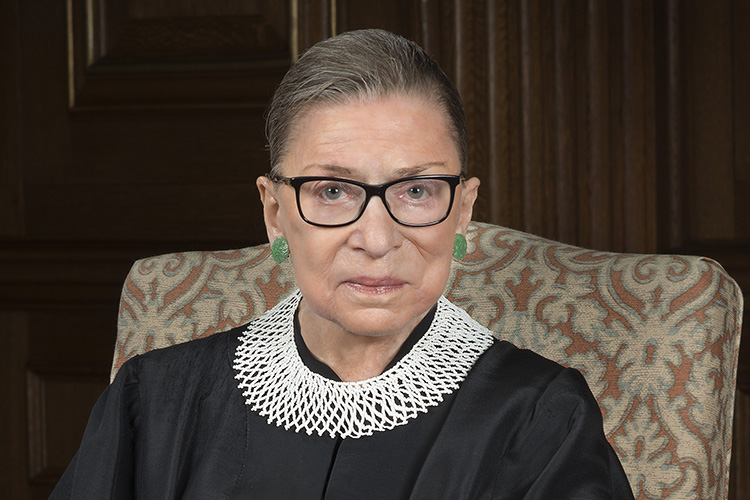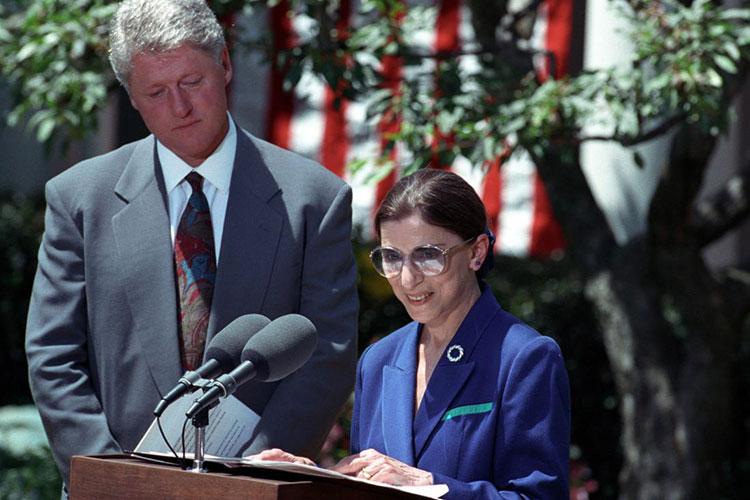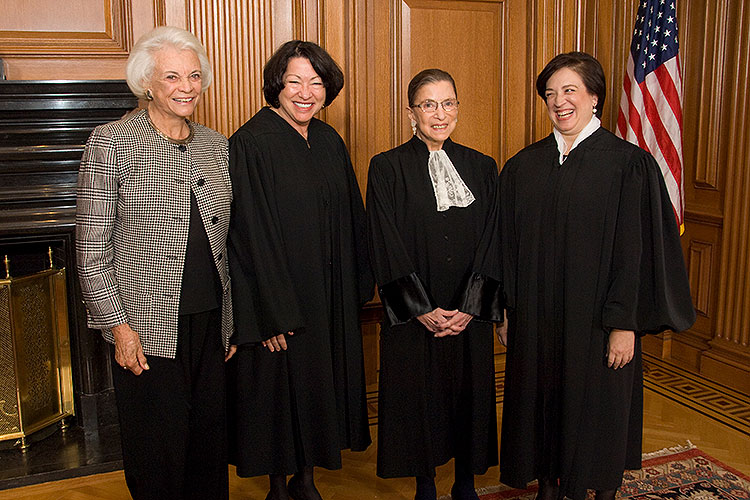
Supreme Court Justice Ruth Bader Ginsburg (Photo courtesy of the Supreme Court of the United States)
The death on Friday of Justice Ruth Bader Ginsburg, the second woman appointed to the U.S. Supreme Court and a pioneering advocate for women’s rights, prompted heartfelt reaction at UC Berkeley, where Ginsberg gave a lecture at a packed Zellerbach Hall just last fall.
The Supreme Court announced her death, which occurred at her home in Washington, D.C., where she was surrounded by family; the cause was complications from metastatic cancer of the pancreas. Chief Justice John Roberts praised her as “a justice of historic stature.” She was 87.
Bader gave the inaugural Herma Hill Kay Memorial Lecture at Berkeley on Oct. 21, 2019, receiving standing ovations before and after the event. Chancellor Carol Christ, in introducing Bader, called her “the first justice in history who is widely, publicly known by just initials.”
Affectionately called “RBG,” also the name of a 2018 documentary that focused on her life and career, Ginsberg achieved rock star status among a new generation, with young women considering her a heroine of power, authority and dignity.
Among her fans was Jessica Williams, a third-year student at Berkeley Law — where 66% of the students are women — and co-chair of the Womxn of Color Collective, a student group at the law school that promotes diversity in the legal field. Williams was in the audience at Zellerbach last year.
“Ruth Bader Ginsburg made it possible for so many women to see themselves on the bench,” said Williams, who graduates next spring. “Losing her when we are so far from nine (women justices on the Supreme Court, a dream of Ginsberg’s) — in a year when it has become glaringly obvious our civil rights need fierce advocates — is deflating. She would want us to keep going. So, we will.”
Of attending the Berkeley lecture where Ginsberg spoke to a rapt audience, she said, “I feel so lucky to have been able to breathe her same air. She was a lion, and made girls see themselves in places we weren’t invited to be, even those who weren’t in law.”
Another third-year law student, Simone Lieban Levine, said she and her family in Bethesda, Maryland, were preparing their dinner table Friday evening for a Shabat meal, at the start of Rosh Hashanah, when her mother got a news alert on her phone about Ginsberg’s death and screamed, “No!” and shared what had happened. Levine also noted that Ginsberg was the first Jewish woman to serve on the Supreme Court.
Co-leader for Berkeley Law’s Reproductive Justice Project and for the Berkeley Law chapter of If/When/How: Lawyering for Reproductive Justice, Levine said she will never forget the excitement of seeing Ginsberg in person at Berkeley Law before the memorial lecture.
“She was walking through the law school, and … I was right in the way for her to walk past me,” she said. “Several huge body guards came in with her, and we were frozen in place. She was so tiny in stature, but so impressive as a human being. She walked toward us, and I said, ‘Hi Justice Ginsberg. Thank you for coming today,’ and she said, ‘Hi,’ and I immediately melted and called my family.”

Ruth Bader Ginsburg, then a judge on the U.S. Court of Appeals for the District of Columbia, accepts her nomination to the United States Supreme Court in 1993 while President Bill Clinton looks on. (Photo courtesy of the White House)
Levine, who plans to attend the vigil for Ginsberg in D.C. on Saturday with her cousin, recalled lining up for an hour and a half before the Zellerbach event and sitting in the front row, where she said she felt “in the presence of greatness.”
She added that Ginsberg “fought for women’s rights, and that’s all I want to do with my career, and my path is reproductive justice. I also love that she said, ‘Fight for the things that you care about, but do it in a way that will lead others to join you.’”
Also in the front row at the lecture last October was Ivey Dyson, a third-year student at Berkeley Law, a member of the Womxn of Color Collective and president of the International Law Society at Berkeley.
“She was so small, but so powerful,” Dyson echoed, adding that she was struck by Ginsberg’s advice to law students about “finding balance and not worrying so much about grades, but to value learning for the sake of learning.”
Dyson said she already had considered Ginsberg a role model in high school, but then, at Berkeley Law, “reading cases in constitutional law really solidified how she fought and changed the conversation about women’s rights in the law and equality, generally. She helped men on the court understand inequality in a way that they might not have. It was really important to see someone hold her own on the court for so long and never waver from her values.”
She said she also has a favorite quote from Ginsberg, one made in response to those who’d ask the justice when there will be enough women on the Supreme Court: “When there are nine,” Ginsberg would say.
Amanda Tyler, the Shannon C. Turner Professor of Law at Berkeley Law, co-wrote a forthcoming book with Ginsberg called In Conversation with RBG: Pursuing Gender Equality Through Her Life and Work. She clerked for Ginsberg from 1999 to 2000.
“She was my idol,” Tyler said of Ginsberg, in a tribute on the Berkeley Law website. “How many people get to say that they worked for their idol?”
“She was a profoundly dedicated public servant, in no small measure because she appreciated just how important her role was to ensuring that our Constitution belongs to everyone,” Tyler wrote. “Whether as an advocate or a Justice, she tirelessly fought discrimination and more generally to open opportunities for every person to live up to their full human potential. … That is pretty special. She made our country better.”

A 2010 portrait of the only four women to have served on the U.S. Supreme Court. From left: Sandra Day O’Connor (retired), Justice Sonia Sotomayor, Justice Ruth Bader Ginsburg and Justice Elena Kagan. (Photo courtesy of the U.S. Supreme Court.)
Ginsberg so moved third-year Berkeley Law student Ashley Johnson, a research assistant to Tyler, that she had Ginsberg’s words of fury, “I dissent,” tattooed onto her wrist before she began law school. (Ginsberg wrote those words in 2000, dissenting from the court’s 5-4 decision halting the Bush versus Gore presidential recount ordered by Florida’s Supreme Court). Johnson said she wanted the tattoo as a reminder of how Ginsberg “changed the face of society for girls, women and humanity, in general.”
Berkeley Law student Emma Blake, co-president of Womxn of Berkeley Law, called Ginsberg’s death “a tragic loss for our nation, at a time when we’ve already suffered so much loss, and I’m devastated about it.”
Ginsberg’s death is expected to set in motion, amid a presidential campaign, a difficult political fight over her successor.
Born the same year that Ginsberg was appointed to the Supreme Court, Blake said she’s “never questioned that I can strive for any —and every— position in the legal field. We have her to thank for that. We have her to thank for eliminating gender discrimination and advancing gender inequality in ways that were unfathomable to everyone but her.”
“It’s because of her vision that I am where I am today, and I know many of my friends feel similarly,” said Blake. “She motivated a generation of womxn lawyers to carry forward her legacy of equality and justice for all.”
Said Johnson, “I am a law student and aspiring civil rights lawyer because she forged the path for me to be able to do so. I hope we all continue to fight for equality in her name — I know I will. May her memory be a revolution.”
tinyurlis.gdu.nuclck.ruulvis.netshrtco.de
مقالات مشابه
- LA County گزارش 25 بیشتر coronavirus مرگ و میر بیش از 1 ، 000 مورد جدید
- چرا ما سیاسی کردن مواد غذایی؟: گلوریا رومرو
- برنده جایزه نوبل در برکلی هاس استاد الیور ویلیامسون می میرد 87
- صدها نفر از معترضان مارس از طریق بالای شهر تورانس در شنبه
- بورس کابینت، یراق آلات و دستگیره کابینت در تهران کجاست؟
- بازار سهام با چکش: 8 مجرمان به سرزنش
- مشاوره قبل از ازدواج ضروری یا ؟
- دانیال طاهری فر و بهینه سازی سایت
- شرکت صادرات و واردات کالاهای مختلف از جمله کاشی و سرامیک و ارائه دهنده خدمات ترانزیت و بارگیری دریایی و ریلی و ترخیص کالا برای کشورهای مختلف از جمله روسیه و کشورهای حوزه cis و سایر نقاط جهان - بازرگانی علی قانعی
- جمل بلمادی، سرمربی الجزایری "محبوبتر از رئیس جمهور"